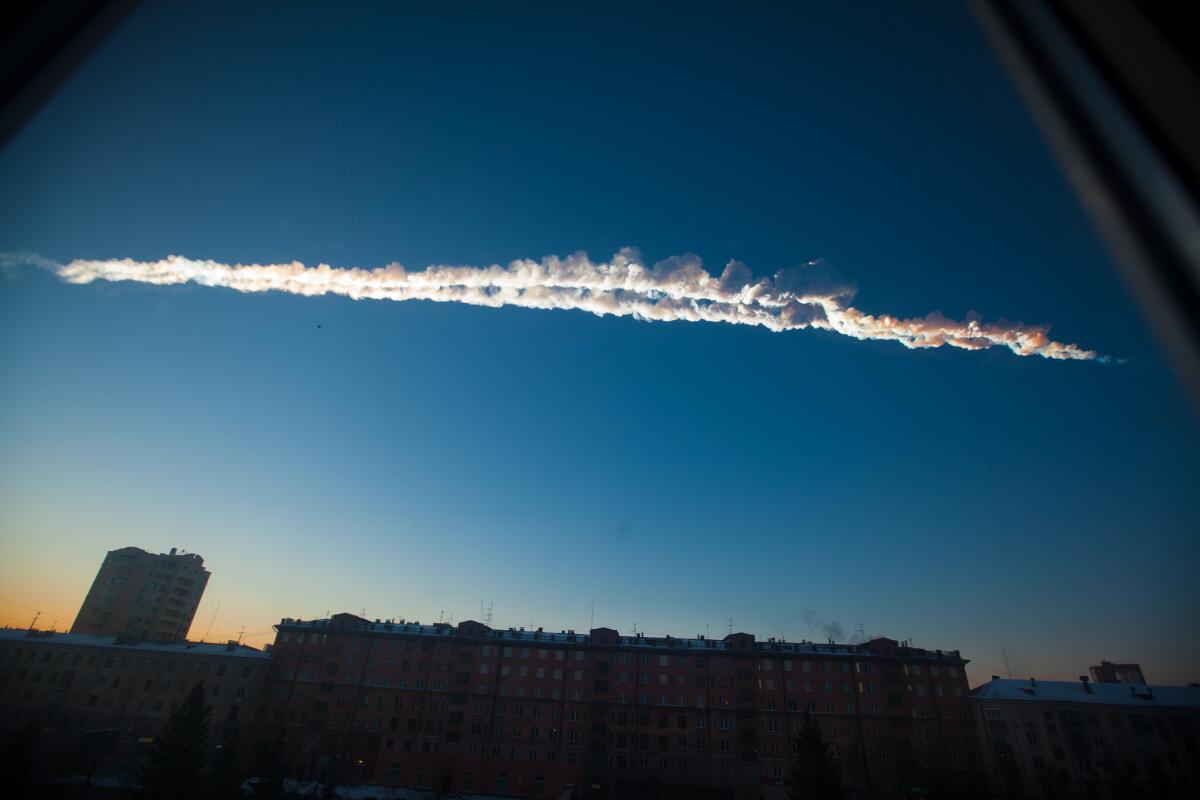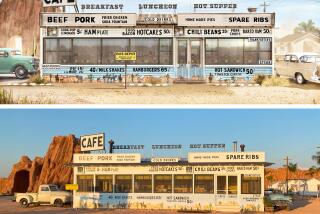Asteroids, asteroids will rock you, Queen guitarist warns

- Share via
It’s never too early to worry about asteroids wiping out life on Earth.
So say the folks who’ve been fretting for decades over just such a scenario -- among them, Queen guitarist-astrophysicist Brian May. They think it’s time all Earthlings focus their anxiety, and asteroid-diversion efforts, on one day.
Not today, though, or even tomorrow. Let’s do it six months, 27 days from now, on June 30, 2015.
A group called AsteroidDay.Org launched its plea for worldwide cooperation to identify and track asteroids and figure out ways to keep them from rocking our planet (71% of which is ocean).
Their announcement Wednesday, live from London and San Francisco, was itself rather rocky. It started late (as is, it began at pub hours in London), had audio and video problems, and attracted 28 viewers on YouTube.
The event did face serious competition on the asteroid front, though. There was the countdown to the Japan Aerospace Exploration Agency (JAXA) launch of its Hayabusa 2 spacecraft, which will chase down an asteroid (1999 JU3), fire a high-speed bullet into it, and collect some of its dust.
There was a NASA press conference and Internet hangout for Thursday’s test launch of the Orion capsule that the agency hopes will one day loft astronauts to an asteroid (and later, to Mars).
And as if that wasn’t enough, AsteroidDay.org’s call for global cooperation to save the planet came as hundreds of other scientists gathered for the 20th year to plea for global cooperation on another threat to life on Earth – climate change. (The confab in Lima, Peru, is called: “The 20th session of the Conference of the Parties and the 10th session of the Conference of the Parties serving as the Meeting of the Parties to the Kyoto Protocol.”)
“I don’t have any scientific background, so I’m not going to go into any statistics or science,” assured filmmaker Grigorij Richters, who also happens to be pimping his asteroid-destroys-Earth disaster pic, 51 Degrees North. He left that task to “incredible scientists,” including “Doctor May.”
May still sports big hair, albeit gray. Back in 1974, the younger Brian iced his astrophysics PhD thesis, on observations of zodiacal dust from Tenerife, to tour with Queen (apparently, the “Galileo! Galileo!” in Bohemian Rhapsody was Freddie Mercury’s shout-out to May.)
Now a visiting researcher at Imperial College London, where his updated thesis was accepted in 2007, May said he was just “an enabler” of the Asteroid Day idea. Then he dropped an asteroid of his own.
“We’ve perhaps eliminated the possibility of a total species wipe-out due to an asteroid impact,” May said. “But,” he added, “there are probably a million objects out there which could destroy a city on the planet, and worse.”
If you can’t help asking: “Is this the real life? Is this just fantasy?” No, assured Bill Nye, the Science Guy. If the asteroid that made a Siberian forest into pickup sticks back on June 30, 1908, (hence, Asteroid Day) had arrived six and a half hours later, it would’ve struck Berlin, Nye said.
Research is underway in Scotland to deploy space craft “to deflect asteroids -- I’m not kidding, everybody -- using lasers,” Nye said. “This stuff sounds like science fiction, but it’s the real deal,” the bow-tied Nye said, via Internet video feed.
“To give you a science fiction thing to think about: Perhaps the reason we’ve never heard from another civilization is that they didn’t pass the asteroid test,” Nye said. “You have to learn to deflect asteroids or you get wiped out.”
The dinosaurs were finished off in just such a fashion, about 65 million years ago, noted astronaut Russell “Rusty” Schweickart, former lunar module pilot on the Apollo 9 mission in 1969.
Moving an incoming asteroid out of harm’s way will “drag it through a lot of backyards,” Schweickart said. “That requires a geopolitical initiative.”
When a meteor struck near Chelyabinsk, Russia, last year, Schweikart said, “7 billion people suddenly realized that these objects can do harm and can hurt people.”
Only about 15-20% of the most massive asteroids -- ones that can impact Earth with the energy of 100 megatons of TNT -- have been identified, said Ed Lu, chairman of the B612 Foundation, a private nonprofit looking to put an asteroid-hunting satellite into orbit.
Lu urged professional and amateur astronomers to “do a hundred times better than we are now” at tracking asteroids.
That, he said “will be what allows us to be smarter than the dinosaurs.”
Smarter than a dinosaur? Follow me on Twitter: @LATsciguy







